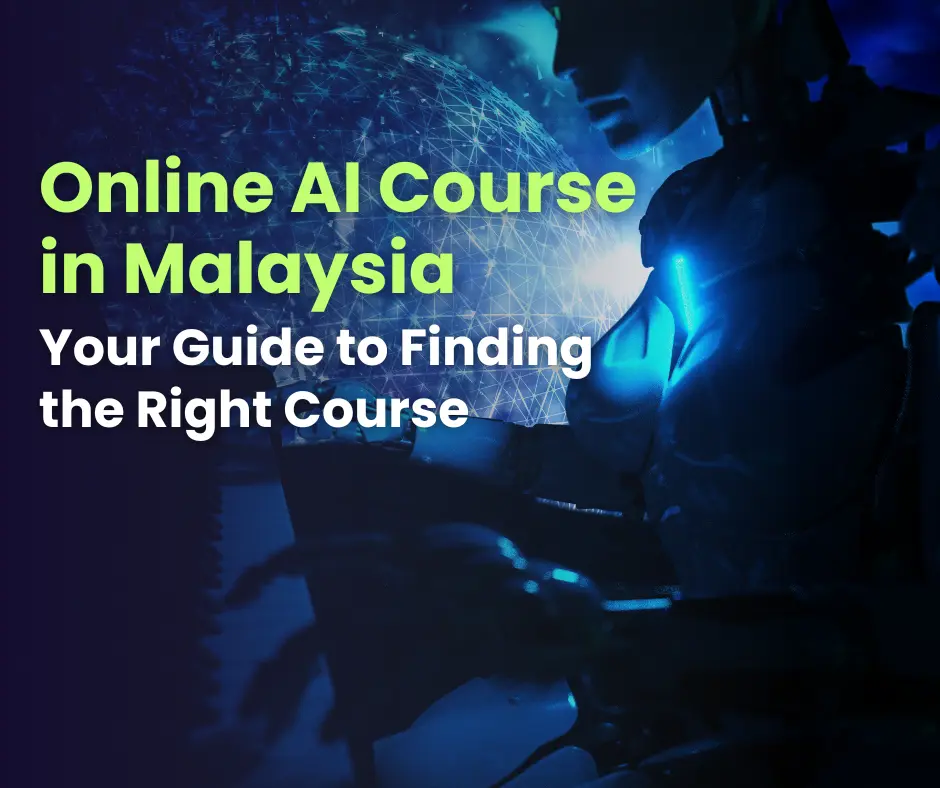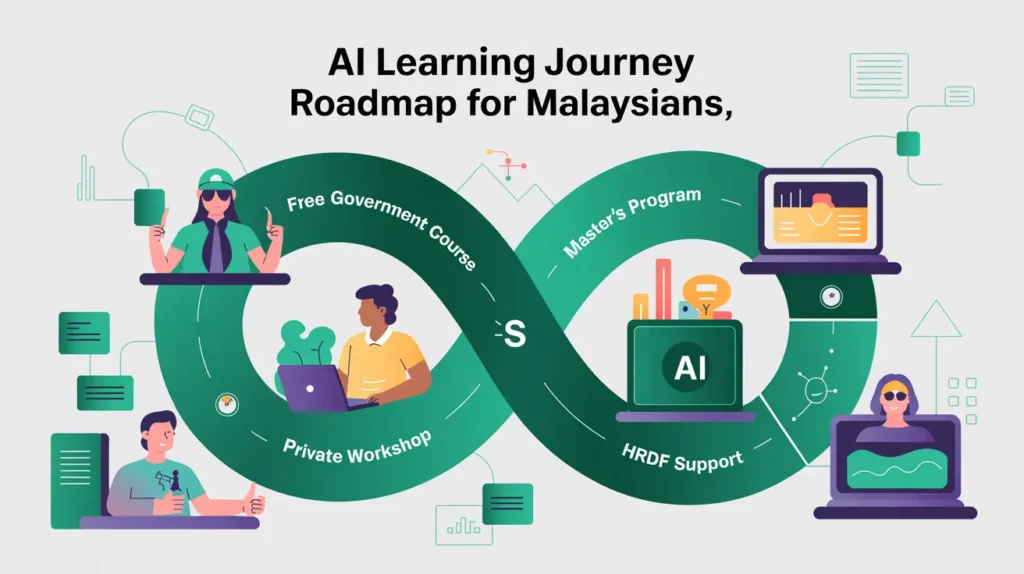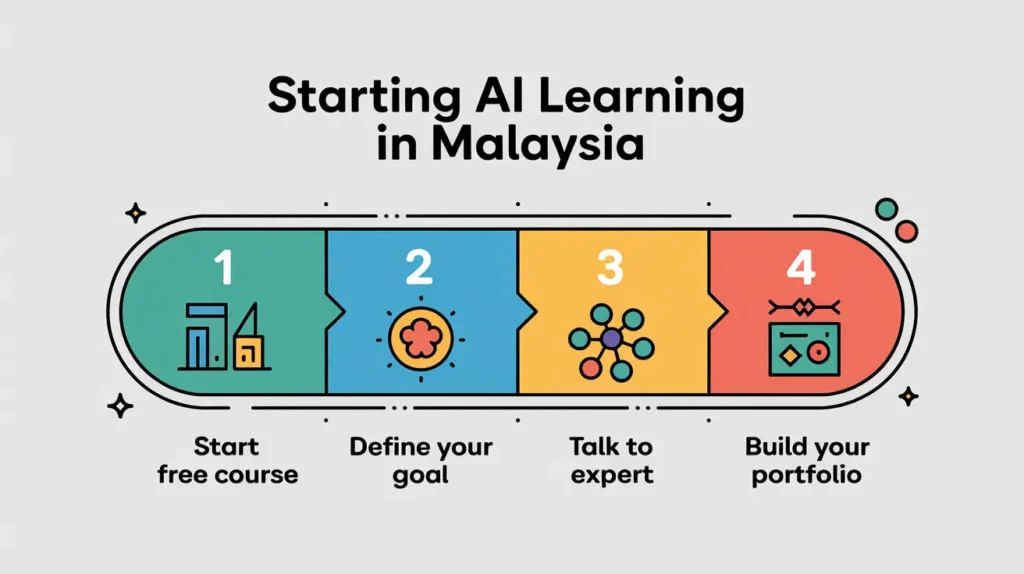
The buzz around Artificial Intelligence (AI) is everywhere. From the chatbots helping you on a website to the algorithms suggesting your next movie, AI is already here.
In Malaysia, this isn’t just a global trend. It’s a national priority. The government is pushing for digital transformation, and businesses are scrambling to keep up. This creates a unique opportunity. Understanding AI is quickly becoming an essential career skill.
But where do you start? The search for an “AI course in Malaysia online” can feel overwhelming. The options are vast, and the technical jargon can be confusing.
This guide cuts through the noise. We’ll walk through the different types of online AI courses available to you in Malaysia. The goal is to help you find a path that fits your goals, your schedule, and your budget.
Why Learn AI Now? The Malaysian Context
This isn’t just about future-proofing your career. It’s about seizing a current opportunity. The demand for AI skills in the Malaysian job market is real and growing.
The former Minister of Science, Technology, and Innovation, Khairy Jamaluddin, has stated that Malaysia needs 20,000 data experts and AI specialists by 2030 to stay competitive. This isn’t an arbitrary number. It reflects the needs of industries from finance and manufacturing to healthcare and agriculture.
The Malaysian government has backed this need with action. Initiatives like the Malaysia Digital Economy Blueprint and the National Fourth Industrial Revolution (4IR) Policy place AI adoption at their core. For you, this translates into a clear signal: AI expertise is a valuable currency.
But it’s not just about becoming a data scientist. Project managers, marketers, entrepreneurs, and HR professionals can all benefit from understanding how AI applies to their work. It allows you to automate routine tasks, gain insights from data, and make better decisions. In short, it makes you more effective and valuable in your role.
Finding the Right Online AI Course in Malaysia
You can broadly group the online AI courses available to Malaysians into several main categories. Each serves a different purpose and audience.
The table below summarizes these pathways, including a practical option for hands-on learning:
| Provider Type | Who It’s For | What You Typically Get |
| Government & Public Initiatives | Malaysian citizens and employees seeking foundational, certified knowledge, often for free or at a low cost. | Broad, foundational knowledge on AI concepts; government-recognized certificates or digital badges. |
| Public Universities | Learners who prefer a structured, academic approach and want a credential from a reputable local institution. | University-certified courses; often part of micro-credential programs; theory combined with practical application. |
| Private Training Providers | Professionals and businesses looking for practical, hands-on skills that can be immediately applied in their work. | Intensive, focused training on specific tools (e.g., ChatGPT, Python); often HRDF-claimable. |
| Local AI Experts & Practitioners | Professionals, entrepreneurs, and businesses in Southeast Asia seeking practical, region-specific AI training from a trusted local expert. | Hands-on workshops focused on real-world business applications (content creation, workflow automation); understanding of local business culture; HRDF-claimable. |
| Full Master’s Degrees | Career-changers or those seeking deep, formal expertise and a postgraduate qualification for advanced roles. | A comprehensive, in-depth curriculum; a Master of Science (MSc) degree; often available via Online Distance Learning (ODL). |
Let’s break down what each of these pathways really offers.

1. Government-Led Initiatives: Your Free Starting Point
The Malaysian government has made it a mission to upskill its workforce. Several portals offer free AI courses specifically for citizens.
- Rakyat Digital (Saya Digital): This national initiative includes a dedicated learning pathway for AI. You can find courses on AI Fluency, AI Safety, and Generative AI. The courses are self-paced, available in Bahasa Malaysia and English, and you receive a digital badge upon completion. For a beginner, this is a zero-risk way to start learning.
- HRD Corp e-LATiH: The Human Resource Development Corporation’s online learning platform also features AI-related courses. The key advantage here is that many courses are HRDF-claimable. If you’re employed, your company can use its HRDF levy to pay for these courses, making them free for you.
The bottom line: If you want to explore AI basics without spending any money, start with the Rakyat Digital portal. It’s a direct, government-backed resource built for Malaysians.
2. Public Universities: The Structured Academic Route
Malaysia’s public universities have entered the online education space aggressively, especially with micro-credentials. These are short, focused courses that carry academic credit.
For example, Universiti Teknologi Malaysia (UTM) offers an “Artificial Intelligence for Everyone” course online. It’s designed to demystify AI for non-technical professionals. The course runs for about 8 weeks and you can often audit it for free or pay a small fee for a verified certificate.
Other universities like Universiti Malaya (UM) and Universiti Sains Malaysia (USM) are also expanding their online offerings in tech fields. These courses give you the credibility of a university certificate and a structured learning path.
3. Private Training Providers: For Practical, Hands-On Skills
This is where the market gets very active. Providers here focus on practical application, answering the “how” more than the “why.”
A standout example in Malaysia is David Hooi of D Action Consultancy.
Drawing from 20 years of corporate experience, David’s programs are built for immediate application . He has trained over 1,500 professionals and worked with companies like Great Eastern and Nu Skin.
His AI programs, such as “AI for Business Transformation” and “AI for Content & Productivity,” are intensive workshops that cover tools like ChatGPT, MidJourney, and Gamma for automating business functions or creating content faster.
A key advantage for Malaysian working professionals and businesses is that his training is HRDF-certified. This means companies can use their HRDF levy to cover the costs, making it a cost-effective upskilling solution.
One case study noted a construction company that improved efficiency by 400% after implementing his AI strategies.
Other private providers also offer similar intensive courses, typically lasting from one to five days, with costs ranging from RM 1,000 to RM 5,000. The training is typically led by industry practitioners, not just academics, which can be incredibly valuable.
4. Full Master’s Degrees: The Deep Dive
For those looking to completely transition into an AI-focused role, a full Master’s degree is the most comprehensive option.
Institutions like Asia Pacific University (APU) offer an MSc in Artificial Intelligence through Online Distance Learning (ODL). This is a major commitment, usually taking at least 2.5 years to complete and costing in the region of RM 30,000 to RM 40,000.
The curriculum is thorough, covering advanced topics like deep learning, natural language processing, and robotics. This path is for you if you need a formal, accredited qualification to pursue a role as an AI engineer, data scientist, or AI researcher.
How to Choose: A Framework for Your Decision
With all these options, how do you pick? Don’t just look at the course title. Ask yourself these questions.
What is your primary goal?
- Curiosity & Basics: Start with a free government course from Rakyat Digital.
- Upskill in Your Current Job: Look for a practical, short course from a private provider. Focus on courses that teach tools relevant to your role (e.g., AI for HR, AI for finance analysis).
- Change Careers: A series of advanced certificates or a full Master’s degree is likely necessary.
What is your background?
Be honest about your starting point. Many introductory courses require no prior coding knowledge.
However, courses labeled “Machine Learning with Python” will assume you have a basic grasp of programming.
Always check the prerequisites.
How much time and money can you invest?
Map your commitment.
- Low Budget, Flexible Time: Free government and university audit courses.
- Moderate Budget, Limited Time: Intensive 2-3 day HRDF-claimable workshops.
- Significant Budget, Long-Term Time: A part-time Online Master’s degree.
Is the provider HRDF-claimable?
This is a critical question for working Malaysians. If the training provider is registered with HRD Corp, your company can use its funds to pay for the course.
Always confirm this before you propose a course to your manager.
Taking the Next Step
The information can still feel like a lot. That’s okay. Here is a simple action plan.

- Start with a Free Course: Dedicate 2-3 hours this week to a free module on AI Fluency from the Rakyat Digital portal. It costs you nothing but time and will give you a much clearer foundation.
- Define Your “Why”: After the introductory course, ask yourself: “What do I want to do with this knowledge?” Your answer will point you to the next, more specific course.
- Talk to an Expert: Sometimes, a little guidance can save you months of wasted effort. If you’re a business owner or a professional looking to integrate AI into your operations, getting tailored advice is a smart move.
This is where practical experience matters. David Hooi, with nearly 20 years of corporate experience and a focus on simplifying AI for businesses, offers tailored consultations. He cuts through the theoretical and focuses on what works in the real world.
If you’re feeling stuck in your search or need guidance on how AI can specifically benefit your career or business, reaching out for a conversation can provide the clarity you need.
Frequently Asked Questions (FAQs)
Here are answers to some common questions about online AI courses in Malaysia:
1. I’m not a tech person. Are there AI courses for someone with no coding background?
Yes, absolutely. Many introductory courses are designed specifically for non-technical professionals. They focus on the concepts, applications, and strategic implications of AI without requiring you to write code.
Look for courses with titles like “AI for Everyone,” “AI for Business Leaders,” or “Generative AI for Marketers.” The free courses on the Rakyat Digital portal are a perfect starting point.
2. How can I verify if an online AI certificate is recognized by employers?
This is a crucial question. For government courses, the certificate is recognized by the public sector. For university micro-credentials, the university’s reputation lends weight. For private providers, employers often value skills over the certificate itself.
The best way to verify is to:
- Check if the provider is HRDF-registered, as this is a common benchmark for quality in corporate Malaysia.
- Look for reviews or testimonials from past participants.
- See if the course curriculum teaches specific, in-demand tools (like ChatGPT Advanced, or data visualization software) that are directly applicable to a job role.
3. What is the main difference between AI, Machine Learning, and Data Science?
This is a common point of confusion.
- Artificial Intelligence (AI) is the broadest term. It’s about creating machines that can perform tasks that typically require human intelligence.
- Machine Learning (ML) is a subset of AI. It’s the method of training a machine to learn from data without being explicitly programmed for every task.
- Data Science is a field that uses scientific methods to extract insights from data. It often uses ML, but also involves data cleaning, analysis, and visualization. Many introductory “AI” courses will cover the relationship between these concepts.
4. Are there any good free international options for Malaysians, like Coursera or edX?
Yes, platforms like Coursera, edX, and Udacity offer excellent AI courses from top global universities. Many allow you to audit the course for free, though you usually need to pay for the certificate.
The key is to ensure the learning style and time commitment suit you. These are a great supplement for individual learners. However, for a structured corporate AI training program with local context and HRDF-claimability, Malaysian-based providers often have the edge.
5. I run an SME. Can I use HRDF to train my entire team in AI?
Yes, you can. If your company contributes to the HRDF levy, you can use those funds to enroll your employees in HRDF-claimable AI courses.
This is an effective way to upskill your team in practical AI applications for sales, marketing, or operations without a significant direct cost.
You would need to work with an HRDF-registered training provider like David Hooi.
6. How much time should I realistically set aside for an online course?
It varies widely.
- A short, intensive workshop: 2-3 full days.
- A self-paced introductory course: A few hours a week for 4-8 weeks.
- A university micro-credential: 5-10 hours per week for a few months.
- A Master’s degree: 15-20 hours per week for several years. The most important thing is to check the stated course duration and weekly commitment before you enroll and to block out that time in your schedule.


Comments:
open a binance account
December 18, 2025 at 1:15 pmI don’t think the title of your article matches the content lol. Just kidding, mainly because I had some doubts after reading the article. https://accounts.binance.com/ur/register-person?ref=SZSSS70P
Daftar di Binance
December 21, 2025 at 3:47 pmThanks for sharing. I read many of your blog posts, cool, your blog is very good. https://www.binance.com/register?ref=IXBIAFVY